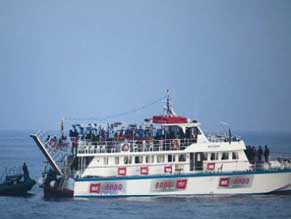|
World Jewish News

Photo by Getty Imagesю
|
Foreign Ministry warned Israel Navy not to raid Gaza flotilla in international waters
10.06.2010, Israel During the government's preparatory discussions over how to handle the Gaza-bound aid flotilla, the Foreign Ministry advised that Israel's security forces wait for the ships to reach the country's territorial waters - which lie within 20 miles from the coast - before launching a takeover operation.
According to a senior official in Jerusalem, Foreign Ministry diplomats said that despite the legality of overtaking the ships in international waters, such an action would hamper Israel on the diplomatic and public relations front worldwide.
Yesterday the forum of seven senior ministers convened again to discuss the creation of an inquiry committee that would be tasked with probing the flotilla raid and easing the blockade on the Gaza Strip.
Following the meeting, the ministers did not release a statement regarding the formation of a panel, which is perhaps indicative of continuing disagreement with the Obama administration over the mandate and composition of the committee.
The Americans would like the committee to include an international entity to placate Turkey, which remains adamant in demanding an international investigation under the auspices of the United Nations.
Jerusalem is expected to announce the formation of a panel soon. One of the key issues to be examined by the committee is the legality of the navy's actions in the eyes of international law.
Speaking at a conference organized by TheMarker, Prime Minister Benjamin Netanyahu said the world had focused too much on Israel without paying due attention to violent attacks by the activists.
"I want the whole truth to come to light," he said. "So it is important to include answers to questions that have until now been ignored by many actors within the international community."
"We have to establish who stood behind this extremist group, who financed its members, and how knives, axes and other weapons were brought aboard," Netanyahu said. "We also need to ask what large sums of money found aboard the boats were doing there, and for whom they were intended."
An Israel Defense Forces internal probe of the flotilla raid is already underway. The head of the investigation, General (res. ) Giora Eiland, will soon begin to compile the findings of the probe into a report. In discussions that preceded the flotilla's arrival and forcible takeover, legal experts with the Military Advocate General's Corps and the Foreign Ministry offered similar opinions which stated that there was no legal impediment to stopping a ship whose operators have already announced an intention to trespass a blockade, even if the takeover is done in international waters.
The legal opinions were based on precedent-setting cases involving the American and British navies as well as citations of the San Remo international law manual of 1994.
Nonetheless, Foreign Ministry officials cautioned representatives of the defense establishment that it would be difficult to justify a military operation outside of Israel's territorial waters from both a political and public relations standpoint.
Thus, according to senior figures familiar with the details of the discussions, the Foreign Ministry urged defense officials to launch their operations to stop the flotilla only after the ships had crossed Gaza's maritime boundaries. The ministry's diplomats repeated this request on more than one occasion.
"If somebody breaks into your home and you shoot him after he enters the doorway, there's no problem in justifying this action in court," said a senior ministry official. "But if you attack the burglar while he is on his way to your house at a distance of two blocks away, then you have a problem."
"It was made clear that we can ultimately prove that we acted according to international law, but this will be very complicated and we will absorb many denunciations along the way," the official said.
Senior figures involved in the planning of the operation praised the improved cooperation between the defense establishment and the Foreign Ministry. While the diplomats' warnings were understood, their recommendation was not accepted due to "operational reasons."
"The navy expressed concern that it would not be able to stop the flotilla once the ships reached within 20 miles of the coast," said an official who had a hand in the planning of the operation. "The IDF was fearful that the naval forces would not have adequate time to complete the operation. The army wanted to overtake the ships gradually and at a relatively great distance from the coast."
Defense and diplomatic officials began preparations for the flotilla's arrival two months prior to its voyage. The efforts were led by the IDF, the Defense Ministry, the Foreign Ministry, and the national media relations division of the Prime Minister's Office.
While officials who took part in the discussions reported full cooperation between the agencies, the National Security Council - the body legally empowered to direct the bureaucratic end of the government's diplomatic and security policy - first held a meeting on the flotilla just 10 days prior to its journey. The NSC was not included in the primary preparations and response.
By Barak Ravid
Haaretz.com
|
|
